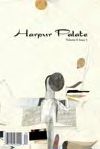> I received the Summer 2006 issue of Harpur Palate because I entered the John Gardner Memorial Prize for Fiction contest. My story, “Stonewall,” was named a finalist in that contest (and ultimately won a different contest—it will appear later this year in Confluence). But this issue includes the winner and two of the finalists, and I’m pleased to have even come close because these are very good stories.
I received the Summer 2006 issue of Harpur Palate because I entered the John Gardner Memorial Prize for Fiction contest. My story, “Stonewall,” was named a finalist in that contest (and ultimately won a different contest—it will appear later this year in Confluence). But this issue includes the winner and two of the finalists, and I’m pleased to have even come close because these are very good stories.
Mona Houghton’s “A Brother, Some Sex, and an Optic Nerve” is the winning story (and is available as a pdf file on the website). It shows Alice, who now lives in Nebraska with her husband Greg, returning to California to visit her mother in the hospital. She stays with her brother Greg who doesn’t seem to be doing much with his life. Gunplay ensues. Here’s a quick sample:
“After snow boots and long underwear the late afternoon sun feels good on your legs. Mike talks about your mother and what the doctors expect to find tomorrow. Last week when he called you, told you what they had discovered inside your mother’s head, you looked up eye and optic nerve in one of Greg’s old biology books. You read about the compound eye, the camera eye. You read about some experiment where a scientist cut the optic nerve and eye muscles on a newt, then rotated the eye 180 degrees, and afterwards the newt moved its head in the opposite direction of stimulation. You had to wait until Greg finished teaching his class that day to find out what it all really meant.”
It’s a story that flows well and the interaction between the brother and sister is credible and compelling, and I like the ambiguous ending. And this is one story where I think the present tense is a good choice—the flashbacks are minimal and the heightened immediacy of the present tense works well. But why second person? It is clear that the speaker here is Alice and is referring to herself in the second person, but if there is some aspect of her character that would cause her bifurcation in this way the story doesn’t reveal it. So the choice feels like the author trying something different and I think the story would have been better in first person. If others have read this story I’d certainly welcome comments on this subject.
Two of the John Gardner contest finalists are here also: “These Woods” by Tara Mantel and “Biting My Arms Off” by Amanda Nazario. I liked them both. The first is broken into sections separately titled, a technique that works well here. This is the story of Nadja a woman who takes in foster children on the reservation and is visited by her sister Sky. One of the children in her care is returned to her birth mother:
“In these woods the mourning is constant and changing; it aches deeply into limbs. It is a monsoon that flows into every organ and washes away longings, addictions, wishes, intentions.”
The second finalist is perhaps my favorite of the three winners. It is told by Lydia, who lives in Manhattan with her boyfriend Anton. They have come to the Midwest to visit Anton’s parents and also to see Joe, Lydia’s former roommate, who lives in Omaha but is moving to Montana for grad school. Lydia returns to Manhattan but still thinks about Joe.
“Sometimes, however, I picture him; he is driving a pickup truck under enormous white clouds, surrounded by the mountains. He wears steel-toed boots, orders whiskey by the bottle at his favorite roadhouse bar, shows girls the one front tooth that isn’t real because the lost eh real one when he was hit by a yellow cab—yes, a real yellow cab!—crossing Madison Avenue, all those years and miles ago.”
“Profession” by Anis Shivani was also a good read. Arthur has recently returned to Madison, Wisconsin, where he and his wife Lauren are on the faculty at the University, from Hanoi, where he has picked up Nam Loc, the boy the couple has adopted. I would love to have had more of the story take place in Hanoi—Shivani shows us briefly the lake and the Old Quarter that I know well from my work there, but that’s about it. Arthur doesn’t mention where he stayed, and he describes Hanoi as a dreary ghost town, a characterization with which I would strongly disagree. (If the story had been set in the ‘80s, I might feel differently, but the time, while not clear, feels contemporary.) There is also mention of a possible drive from Hanoi to Ho Chi Minh City—a drive that is possible but is not undertaken lightly by foreigners who usually fly between the two cities. But what is interesting here is the relationship between Arthur and Lauren, who don’t really even live together and seem unlikely candidates for adoptive parents. Still, this was a good read.
The last two fiction pieces in the issue are “The Other Sister,” by Jacob Appel and “A Love Story” by Christine Grimes, both very well done, offbeat stories.
I’m very impressed by Harpur Palate and plan to keep reading.
Next up: The Sun
